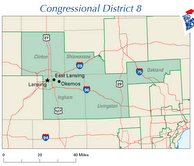Tuesday, October 27, 2009
PAC Man
Wednesday, October 7, 2009
Patriot Games
"The political environment has shifted, and there just aren't five more vulnerable Members who are really in need of assistance or facing a credible challenge," an NRCC aide told the paper. "That money would be better spent by directly transferring money to the committee and on assisting the large number of challenger candidates looking to oust a Democrat incumbent."
Another way of looking at it is this: The Republicans got cleaned out in 2006 and 2008. With the exception of some open swing seats where usually safe GOP incumbents are retiring, there's not too much left that the GOP has a serious chance of losing.
Thursday, October 1, 2009
Very High Double Standards
Members of Congress do not pay for the individual services they receive at the OAP, nor do they submit claims through their federal employee health insurance policies. Instead, members pay a flat, annual fee of $503 for all the care they receive. The rest of the cost of their care, sources said, is subsidized by taxpayers.
Tuesday, September 29, 2009
Don't Know Much About History
His latest YouTube special kicks off with a quote from Benjamin Franklin (sort of),
Those who would sacrifice liberty for a little safety and security deserve neither liberty nor security.
We have agreed that a safety net is a good idea. So you think about it, the Great Depression, over 30% unemployment for years, the poverty level in the United States was staggering, but we didn't give up. We didn't say, "you know what, it's too hard, the federal government should do it for us." We didn't do that.
World War II, when they were rationing sugar and rubber tires, we didn't give up. And that spirit, that ember of fairness on behalf of the American people has led to the greatest nation on the face of the earth, because it's individual responsibility, it's people getting up everyday and thinking, "I can do this better, faster, quicker, the speed of business, I can take care of my family, let the government take care of something else."
As in the course of the debate, some lords in the administration had observed, that it was common and easy to censure their measures, but those who did so proposed nothing better.
Tuesday, September 15, 2009
Money Talks, Congress Listens
Committee Chair Henry Waxman told 52 insurance companies that they had to disclose their financial records, including executive pay, entertainment expenditures and, oh yes, political donations.
Here are the current members of the House Energy and Commerce to collect the most from the 52 insurers required to respond to Waxman's request, including contributions to the lawmakers' leadership PACs and candidate committees back to 1989:What's impressive (in a bad way) is that Mike Rogers didn't get elected until 2000 -- yet he's managed to scoop up enough insurance industry cash to come in fourth at the trough.
Name Total
Roy Blunt (R-Mo) $204,428
John D Dingell (D-Mich) $154,600
Nathan Deal (R-Ga) $150,600
Mike Rogers (R-Mich) $109,800
Henry A Waxman (D-Calif)$106,500
Bart Stupak (D-Mich) $94,750
John Shadegg (R-Ariz) $94,250
Joe Barton (R-Texas) $84,350
Lee Terry (R-Neb) $84,300
Phil Gingrey (R-Ga) $83,770
Tim Murphy (R-Pa) $81,700
Fred Upton (R-Mich) $78,300
John M Shimkus (R-Ill) $73,750
Bart Gordon (D-Tenn) $73,550
Jim Matheson (D-Utah) $72,500
Thursday, September 10, 2009
Pop-Up Video
I really wish that I could do that for Mike Rogers' latest YouTube video... but National Journal has done the next best thing:
With so many people looking to the video for their health care arguments, how true are Rogers' main points about H.R. 3200 and the debate in general?National Journal fact-checks Rogers' statements on disenrolling individuals and cancer survival rates. They'll follow up with an interview with Rogers, to be posted next week.
Tuesday, September 8, 2009
Hell is, in fact, freezing over.
and now Debbie Schlussel has named him the Hypocrite of the Day:
U.S. Congressman Mike Rogers (R-Michigan) sent out press releases telling everyone and their mother that, yesterday, he was in Israel speaking at a conference on terrorism.Amen.
But, with blowhard Rogers – a conservative – as the keynote speaker, perhaps the “World Summit on Counter-Terrorism, ” should change its name to “World Summit on Counter-Terrorism and Phony American Congressmen Who Blew It.” Rogers needs to shut his mouth, stay Stateside, and actually do something on terrorism. Problem is, he’s all talk and ZERO action. [skip]
Ironically, Rogers’ speech was on “Where America Stands Eight Years Into Its War on Terror.” Hilarious. In no small part because of Rogers’ negligence, American stands no better–in fact, far worse–than it did eight years earlier.
Wonder if the speech was subtitled, “Do As I Say, Not As I Do.”
Now, it's pretty likely that Ms. Schlussel and and I don't quite see eye to eye on a lot of issues, but we both agree that Mr. Rogers' brand of bull is bad for our country's security.
Excuses, excuses
America’s Affordable Health Choices Act would provide significant benefits in the 8th Congressional District of Michigan: up to 15,100 small businesses could receive tax credits to provide coverage to their employees; 7,600 seniors would avoid the donut hole in Medicare Part D; 1,700 families could escape bankruptcy each year due to unaffordable health care costs; health care providers would receive payment for $53 million in uncompensated care each year; and 49,000 uninsured individuals would gain access to high-quality, affordable health insurance.
Friday, September 4, 2009
Echo Chamber
they will lose their private health care or Medicare benefits if proposed health-care reforms become law. [skip] Rogers said the bill would dash Medicare Advantage plans that can include prescription drug coverage, among other options.
America’s Affordable Health Choices Act would provide significant benefits in the 8th Congressional District of Michigan: up to 15,100 small businesses could receive tax credits to provide coverage to their employees; 7,600 seniors would avoid the donut hole in Medicare Part D; 1,700 families could escape bankruptcy each year due to unaffordable health care costs; health care providers would receive payment for $53 million in uncompensated care each year; and 49,000 uninsured individuals would gain access to high-quality, affordable health insurance.
Friday, August 28, 2009
Fan Fiction
The very innovation of who we are is what got us here, and it wasn't the federal government and it wasn't Washington, D.C.
They can actually go in and unenroll individuals -- unprecedented power... They can rip you off your own invididual plan. They can disenroll your whole company off a certain plan.
Rescinding thousands of policyholders a year enabled California insurers to save millions of dollars. Health Net Inc., for example, figured that it avoided $35 million in medical expenses over six years. The loss of coverage left individuals awash in medical bills and without healthcare when they needed it most, and it left many hospitals and physicians with uncollectable debt. (emphasis added)
For these patients, having private health insurance at the time of their cancer diagnosis did not protect them from high out-of-pocket costs – leaving them with large debts to cover their treatment costs and forcing some to skip or delay necessary treatments.
“The stories of people with cancer in this study and video documentary show what our earlier survey work found: that the insurance system often fails people when they need it most, when they get really sick,” said Kaiser Family Foundation President and CEO Drew Altman, Ph.D.
“Cancer patients too often find out that their insurance doesn't protect them when they need care the most,” said John R. Seffrin, Ph.D., national chief executive officer of the American Cancer Society. “High out-of-pocket costs coupled with the high cost of insurance premiums can force cancer patients to incur huge debt, and to delay or forgo life-saving treatments."
The crazy thing is that Mr. Rogers, a beneficiary of generous government health coverage for most of his life, is a staunch defender of the health care status quo.
Wonder if it has anything to do with the money he and his PAC have received from health-related industries?




